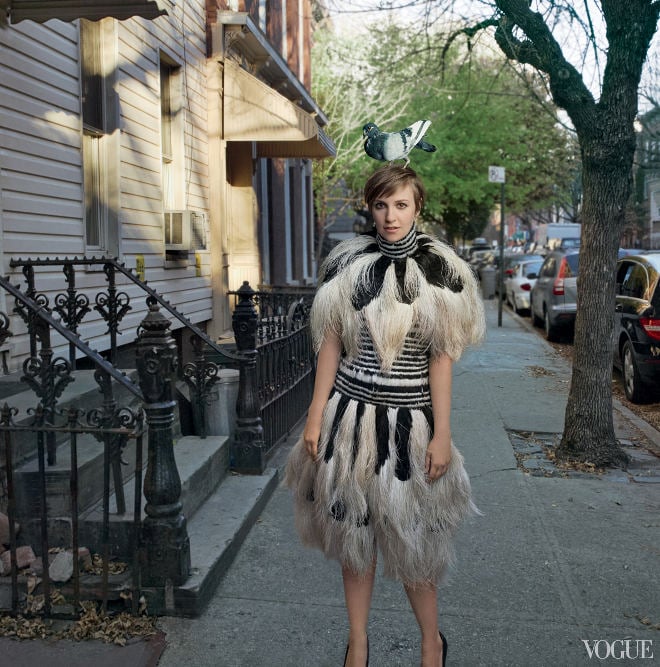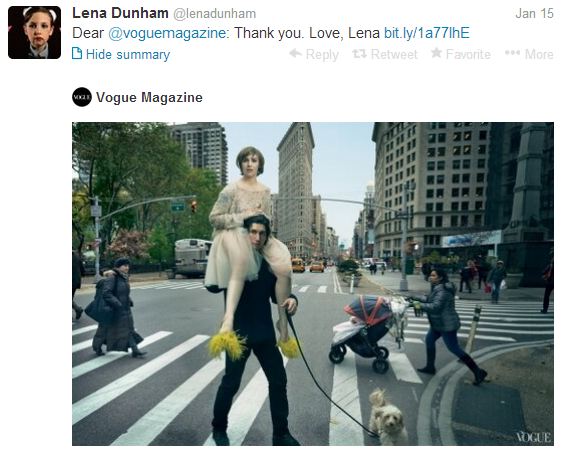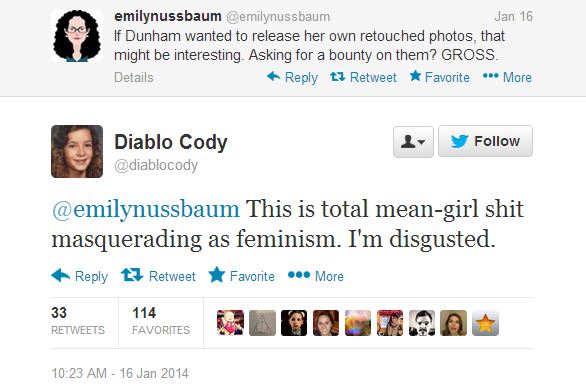Junk Explained: On Jezebel vs Vogue’s Lena Dunham Shoot, And “Mean-Girl Shit Masquerading As Feminism”
Last week, Jezebel lifted the lid on Vogue's retouched images of Lena Dunham. All they got was laughed at by most of the web, and an eye-roll from Dunham herself.

On Thursday last week, Vogue released the anticipated cover feature of its February issue, featuring Girls creator/writer/star Lena Dunham in a high fashion shoot manned by Annie Leibovitz. The feature was great (read the best bits here), and the accompanying photos were as excellent as expected.
Especially this one, dressed by Alexander McQueen and pigeon.

The feature was initially met with enthusiasm: there’s nothing the internet loves more than Lena Dunham. But it didn’t take long for online women’s hub Jezebel to land on an outrage angle that’d guarantee maximum clicks.
In an article called ‘We’re Offering $10,000 For Unretouched Images of Lena Dunham In Vogue‘ — a remake of the 2007 Faith Hill bounty that made the site’s name — editor Jessica Coen explained why she was demanding raw images of the shoot. “Now, on its cover, Vogue has a woman who rightfully declares that her appearance, with all of its perceived imperfections, shouldn’t be hidden and doesn’t need any fixing … But that’s not really Vogue‘s thing, is it?” she wrote. “It doesn’t matter if any woman, including Lena, thinks she’s fine the way she is. Vogue will find something to fix.” Jezebel wasn’t looking to finally lift the lid on what Dunham’s body looks like: “We can see that every Sunday night or with a cursory Google search.” Instead, Coen wrote, she wanted Vogue to own the role they play in perpetuating unrealistic ideals of what a woman should look like.
Where was Lena Dunham in all this? Praising the shoot on Twitter, and being ignored by Jezebel:

–
While some defended Jezebel’s campaign, the internet as a whole wasn’t having a bar of it.

‘You Don’t Need Unretouched Photos of Lena Dunham‘, wrote Allie Jones and Esther Zuckerman for the Atlantic. Calling the whole thing “petty” and “a stunt”, which paid no heed to Leibovitz’ creative process or Dunham’s agency in the whole thing, they reminded us that Vogue is an aspiration magazine that deals in fantasy imagery — and that Dunham would have been aware of that before she signed up. If Jezebel’s real issue was with the fashion world’s reliance on Photoshop, they wrote, Vogue could be shamed “without publishing side-by-side comparison photos of an actress who is already constantly criticized for the way she looks.”
But the wheels were in motion.
It took only two hours for Jezebel to get their hands on the pictures, which they published to the sound of an anticlimactic thud. Surprise! The tweaks were extremely minor, fixing the lighting, filling out Dunham’s eyebrows, shading her jawline, covering her cleavage, fixing up her hair, and — shock horror — digitally inserting the head-pigeon (or so Jezebel alleged; it turned out, embarrassingly, that the pigeon was real, too).

In her GIF-accompanied write-up, Jessica Coen desperately reached to justify her outrage, landing only on mixed messages and a bizarre attack of the standard practice of composite imagery. “While Dunham’s images were not drastically altered,” she concluded, “it’s important to remember how unforgiving the media is when it comes to images of women”. Congratulations, Jezebel! You just bought yourself a $10,000 lesson in ‘Duh’.
And where was Lena Dunham in all this? She was rolling her eyes on Twitter:

–
‘Jezebel Blows The Lid Off The Lena Dunham Pigeon Scandal‘ wrote Esther Zuckerman for the Atlantic, comparing the GIFs and arrows to “some sort of sorority hazing ritual”.
‘Jezebel Falls Into Feminist Self-Parody‘, wrote Caitlin Dewey for The Washington Post: “What it actually shows, I suspect, is a blog profiting off the same ogling and body-consciousness it’s allegedly fighting against.”
The Cut’s Kat Stoeffel wrote of the anti-climax, too: “Vogue retouch all women, regardless of their weight, beauty, self-esteem or net worth. Their images are creative nonfiction, not journalism … and Jezebel’s $10,000 challenge didn’t make the issue Vogue‘s aesthetic; it made the issue Dunham’s body.”
Oh, and where was Lena Dunham in all this? She was talking to Slate France:
“I understand that for people there is a contradiction between what I do and being on the cover of Vogue; but frankly I really don’t know what the photoshopping situation is, I can’t look at myself really objectively in that way. I know that I felt really like Vogue supported me and wanted to put a depiction of me on the cover. I never felt bullied into anything; I felt really happy because they dressed me and styled me in a way that really reflects who I am. And I felt that was very lucky and that all the editors understood my persona, my creativity and who I am. I haven’t been keeping track of all the reactions, but I know some people have been very angry about the cover and that confuses me a little. I don’t understand why, photoshop or no, having a woman who is different than the typical Vogue cover girl, could be a bad thing.
A fashion magazine is like a beautiful fantasy. Vogue isn’t the place that we go to look at realistic women, Vogue is the place that we go to look at beautiful clothes and fancy places and escapism and so I feel like if the story reflects me and I happen to be wearing a beautiful Prada dress and surrounded by beautiful men and dogs, what’s the problem? If they want to see what I really look like go watch the show that I make every single week.”
–